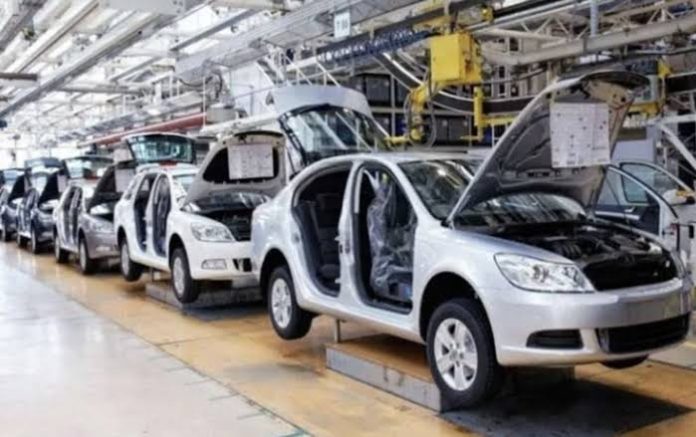The National Automotive Design and Development Council has stated that the payment of the N20bn consumer credit fund for locally produced vehicles will begin in January 2025.
This effort intends to increase local automobile manufacture and make vehicle ownership more affordable to Nigerians.
The Director-General of NADDC, Joseph Osanipin, revealed this at the council’s 2024 end-of-year media briefing on Friday in Abuja.
The fund, established through a collaboration between the Nigerian Consumer Credit Corporation and NADDC, was initially launched two weeks ago with agreements signed between the government and prominent local automobile manufacturers.
These manufacturers include Innoson, Nord, CIG (GAC), PAN, Mikano, Jets, NEV (electric vehicles) and DAG.
Osanipin explained that the credit would be available at low interest rates to ensure ease of repayment for Nigerians seeking to purchase locally-assembled cars, tricycles, and motorbikes.
He stated that the programme would empower Nigerians and foster the expansion of the nation’s automobile industry.
Osanipin promised that Nigerians would receive the loan at a cheap interest rate and in a way that would make repayment simple.
Apart from encouraging the purchase of indigenous automobiles, Osanipin talked about the government’s determination to close the infrastructural gap impeding the broad use of compressed natural gas.
He acknowledged that the existing infrastructure cannot yet fully support the demand for CNG but highlighted ongoing investments to address this challenge.
“The infrastructure we have currently cannot 100 per cent support the demand for CNG. However, the Federal Government is working seriously on that,” he said.
Osanipin referenced a N122bn allocation released on September 30, 2024, aimed at supporting investors and stakeholders across Nigeria’s geopolitical zones to develop CNG infrastructure.
He compared the development of CNG infrastructure to building the foundation of a house, noting that results may not be immediately visible but will become apparent once projects are completed.
“A lot of investments are going into the provision of infrastructure to support gas. Once these projects are completed, we will begin to see the results in the near future,” he said.
He cited the example of NIPCO, a company experienced in gas distribution, while mentioning that other operators are also actively setting up CNG facilities.
Highlighting the benefits of CNG, Osanipin noted its potential to reduce operational costs significantly.
“For instance, a trip that costs N550,000 with diesel can be done for N90,000 with CNG. This gives users a savings margin of N460,000 per trip.
“Such reductions can lead to lower product costs, which benefit both firms and consumers,” he noted.
He went on to say that more businesses are investing in CNG infrastructure in order to stay competitive.
Osanipin also addressed the country’s high reliance on imported motorbike spare parts, which presently costs Nigeria over $19 million per year.
To reduce this dependency, he highlighted the upcoming Nnewi Auto Industrial Park, a project being developed in partnership with the United Nations Industrial Development Organisation.
“Our investigation shows that the value of motorcycle spare parts imported into the country annually is close to $19 million. If we can produce these parts locally, we will save a significant amount in foreign exchange and create opportunities for local manufacturers,” he said.
The Nnewi Auto Industrial Park will offer shared facilities, including electricity, security, and modern production equipment, to support small and medium-scale manufacturers.
“Under this plan, manufacturers will exchange resources such as conference rooms and manufacturing facilities. This strategy will help them expand capacity, reduce production costs, and facilitate scaling up,” Osanipin noted.
Osanipin also cited plans to restore domestic tyre and battery production, which would reduce Nigeria’s dependency on imports.
“We are working with a local company capable of producing tires for two-wheelers and three-wheelers. Once revived, this company could meet at least 60 per cent of Nigeria’s demand for such tires,” he stated.
Additionally, discussions are ongoing with stakeholders in battery production to enhance local manufacturing capabilities.
To remain competitive under the African Continental Free Trade Area (AfCFTA), Osanipin stressed the importance of increasing local capacity and ensuring standardization.
“If we fail to enhance our local capacity, Nigeria will become a dumping ground for foreign products once the trade barriers among African countries are removed,” he warned.
He noted that NADDC is collaborating with customs, manufacturers, and the Ministry of Finance to simplify processes and reduce costs like demurrage.
“With these efforts, we are confident that Nigeria’s automotive industry will experience significant growth, benefiting both businesses and consumers alike,” he concluded.
Osanipin expressed optimism that these initiatives would strengthen Nigeria’s automotive industry, boost local manufacturing, and reduce dependence on imports.

